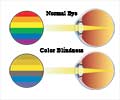Q: Which doctor should I consult for color blindness?
A: An Ophthalmologist can help in diagnosis and management of color blindness.
Q: Should I train myself for passing any type of Color Blindness Test?
A: There is no training required for passing any type of color blindness test. The tests involve detecting the innate ability of the eyes to identify and discriminate colors.
Q: Is color corrective lens useful in the management of color blindness?
A: A few persons with color blindness may find that using color corrective lenses may make their vision brighter and more vivid. They may perceive certain colors for the first time.
For people who find corrective lenses beneficial, it may help in their workplaces like computers and electronics, graphics and fine arts.
Q: Is color blindness a disease?
A: Color blindness is not a disease. It is a condition that results from wrong coding of the cone cells of the retina due to altered genetic makeup. The condition is not progressive, that is, it does not deteriorate with age or time. It is not infectious and there is no known cure for the same.
Q: Are animals and birds color blind?
A: Different animals and birds have varying degrees and different types of color blindness.
Dogs, cats and mice see mostly grays, some blues and yellows. Bulls see only black and white shades. Some animals like squirrels, monkeys and insects see a good range of color. Pigeons are known to be the best at color detection among all creatures on earth.












